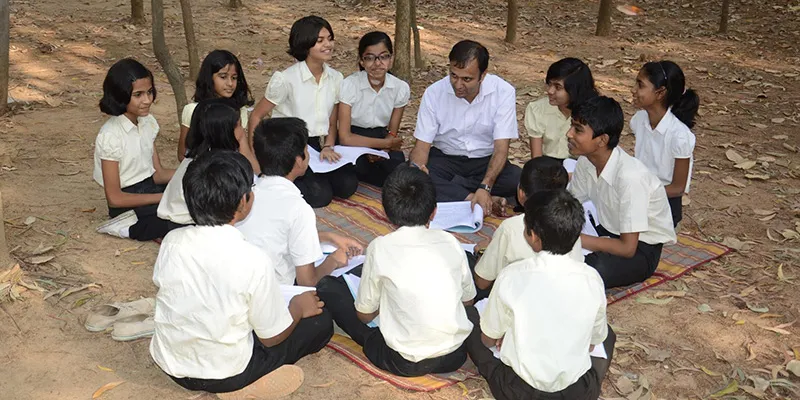Educational technology in 2018: the need for smarter apps and technology-savvy educators
Technology-driven education is supposed to be the future. But do these apps sound futuristic at all? A need for smarter apps and tech-savvy education is emerging.
If you go to Google Play and search for the top education apps, you are unlikely to notice anything unusual. But delve deep into the top apps and read their descriptions, and you will see that they contain marketing pitches like:
- Complete syllabus coverage for classes 4–12; chapter-wise tests
- Preparation for IITJEE, CAT, AIPMT
- Mapped as per the CBSE/ICSE curriculum
- Best app for exam preparation
- Current affairs and GK for IAS and SSC
We always complain about our ailing education system not preparing our children for life. We complain about our obsession with exams, our rigid boards, and obsolete curriculum which put India at the bottom where international tests like PISA are concerned. After all that whining, it is indeed sad that the future of education — technology-aided learning — is also firmly rooted in the past with its unthinking focus on curricula, boards, and exams.

Technology puts more power in our hands. It enables us to do anything faster and better. But the question is — do we want our technology to help us do the wrong things faster and better? Do we want our educational apps to help us run backwards faster? Do we want our technology to deliver the same content that put us at the bottom of the world education rankings, creating a pool of unemployable youth, so much so that our PhDs sometimes apply for peon positions?
Most of the educational apps and software available in the Indian market now have the wrong focus. They are often online, self-learning versions of textbooks — helping our children memorise and prepare for exams better. Most of them do not focus on skill building, which is really the need of the hour.
In addition, most apps do not even exploit the full power of technology. Most do not feature adaptive learning — where the app figures out the student’s skill level and comes up with problems of appropriate difficulty. Most of the math apps have a pre-fed, limited number of sums, rather than exploiting the ability of technology to generate unlimited sums algorithmically. Almost none of them uses big data to benchmark performance and skill levels of the large population of students.

We do not need these textbook replicas masquerading as apps. We must have smarter educational apps that address the skill gap in our curricula, rather than mapping themselves to the outdated syllabus. In 2018, let’s hope to see some great apps/software in some of these areas:
- Logical reasoning: Japanese puzzles like Sudoku, Shikaku, Nonogram, etc. can help build logical reasoning abilities in children. In addition, they are a lot of fun! While the app stores are full of Sudoku apps, there is almost no Sudoku app focusing on children, serving Sudoku in smaller 4x4 or 6x6 grids.
Similarly, puzzles like Multiplication Kakuro can really help children learn calculation along with improving their reasoning skills. I hope in 2018 we get to see a lot more apps mixing calculation and logic.
- Reading: Reading is the most elemental skill, but I see almost no app/software in the market that focuses on its development.
Reading is very amenable to self-learning. Most of us developed reading skills through books, magazines, and newspapers. I can imagine an adaptive program using the same principles cleverly. It can have a large number of stories and passages of varying difficulty, along with exercises and hints. The stories and passages can be served to the students based on their skill level, which is constantly gauged by the program. Instead of addictive social media apps, it will be great if we had an addictive reading program!
It is not just our technology that needs to get smarter. Our educators need to get smarter as well.
With all due respect, a lot of the principals are not particularly tech-savvy. Sometimes the old-guard masks their lack of comfort with technology with a holier-than-thou approach. They take a stand that all technology is harmful, and we must have teacher-centric education rather than technology-aided education.
But it’s not really an either-or debate. We need teachers who can be mentors to our children, who can interpret the complex world for them, connect concepts, and diagnose learning difficulties. But such teachers are a rare breed. Most spend their time doing repetitive tasks — checking homework, giving sums on the board, giving ineffective explanations. Those tasks can and must be replaced by technology. In the world of the future, you should be a teacher only when you can do tasks that an algorithm cannot.

If we have principals who are more technology-savvy, they will do more than turning their classrooms into so-called smart classes. The true smart schools must teach their children how to communicate through email, how to create and deliver presentations using PowerPoint, and how to do research using online resources, rather than just submit copy-paste projects. Those smart schools will also talk to their students about the evils of technology: the ills of social media addiction, the spread of fake news, and the danger of online trolling and harassment.
The true smart schools will also go beyond learning apps and will embrace technology in numerous other ways.
Maybe they will have a Twitter handle for each student and teacher, which could become a lively forum for exchanging ideas. Maybe they will encourage the children to maintain their personal blogs for expressing opinions. Maybe they will have their students manage the school’s technology infrastructure. Maybe they will even teach their children to code right from middle school.
Technology is going to transform our lives, and education is nothing if not preparation for life. So we cannot have a limited vision of how technology should be used in schools. As we usher in the new year, let’s bring in a new mindset towards technology too, a mindset that goes beyond the learning apps and smart classes.
(Disclaimer: The views and opinions expressed in this article are those of the author and do not necessarily reflect the views of YourStory.)







